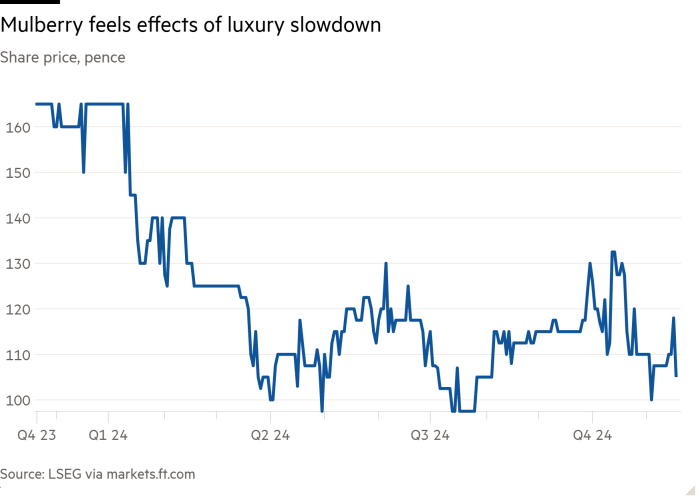Unlock the Editor’s Digest for free
Roula Khalaf, Editor of the FT, selects her favourite stories in this weekly newsletter.
The new boss of luxury handbag maker Mulberry said he was slashing about a quarter of corporate roles and reducing exposure to China as part of efforts to simplify the lossmaking British company and return it to profitability.
Andrea Baldo, who was parachuted in as chief executive less than three months ago to turn the company around, said he had taken “decisive steps to streamline operations”, including cutting 85 of 350 corporate roles, as well as improving margins to place the business on a firmer financial footing.
News of the measures came as Mulberry announced that half-year sales fell by a fifth and losses widened amid a global slowdown in luxury spending, particularly among aspirational shoppers in countries such as China.
Shares in Mulberry, which last month rejected a £111mn conditional offer from second-largest shareholder Frasers Group, fell 10 per cent on Tuesday, valuing the company at just under £75mn.
Revenues fell 19 per cent to £56.1mn in the six months to September 28. The company’s loss before tax was £15.7mn, compared with £12.8mn in the same period last year, partly because of lower sales and profit margins, which fell to 67 per cent, from 70 per cent in 2023.

Mulberry’s 39 own stores in Asia-Pacific are under review after sales fell 31 per cent to £9.3mn — mainly because of a slowdown in China and South Korea, where retail purchases were down 52 per cent and 29 per cent respectively.
Baldo, who previously ran Danish womenswear brand Ganni, said China was “creating most of the problem”. Many of the stores in the region were lossmaking and therefore he would seek to either renegotiate the leases or shut outlets when they come up for renewal.
He also said Mulberry would alter its product line-up, prices and distribution, and that it was in talks with wholesalers “to ensure we are present wherever our customers shop” rather than disproportionately selling too many of its leather goods directly to consumers.
Prices for its staple handbags should be about £1,000, targeting customers looking for more affordable luxury goods, although he emphasised that Mulberry had not increased prices meaningfully in recent years.
Baldo said “challenging and volatile macroeconomic environment” had affected consumer confidence, particularly in the UK, its main market and the new area of focus as he strives to recruit more shoppers at home.
Mulberry’s rejection of two approaches from Frasers came as majority owner Challice, which has a 56.4 per cent stake and is controlled by billionaire property tycoon Ong Beng Seng and his wife, Christina, said it was not interested in selling.
Mulberry said it had incurred £824,000 in redundancy costs in the half year. It added that a strategic review of the business would be finished in December and it would provide more details at a later date.
Sales in the UK, its largest market, fell 14 per cent to £31.3mn during the period. However, retail sales in Australia were up 3 per cent on the same period last year.








